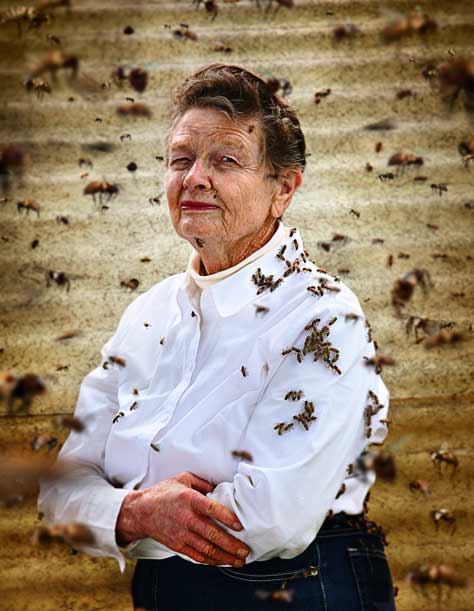Alice Wiemers
Text by Katrina Fried
Photo by Paul Mobley
Alice Wiemers, grain, livestock, and bees, Hondo, Texas.I guess you could say that when I married my husband, I married the bees. He said, "C'mon Alice, help me with the bees!" So that's how I learned about honeybees. I was a total novice. But he'd started as a beekeeper in his teens, helping out a neighbor, and just got hooked. We make our principal income as grain and livestock farmers, but keeping honeybees has been our hobby for the past fifty-eight years.
In the agricultural world, bees are actually considered as livestock. So, just like all of our animals, the bees have management needs. We see to it that they're in the proper location, protected from predators and close to water. And we inspect the hives throughout the year to make sure that they're healthy.
I would say most of the time we have a dozen or two colonies. That's not many compared to the beekeepers who do this as their living-they have thousands of hives. However, we have a nice little local business selling honey, and we consume a lot of honey ourselves. We sweeten our beverages with honey, and I do some baking with it. We have honey for the pancakes, and for the cornbread. No, ma'am, we never get sick of it. And each time you take the honey from the hive it has the unique flavor of the particular flower that the bees were pollinating and visiting for nectar.
The most important thing the honeybee does is to pollinate the flowers so they can bear fruit. They are responsible for almost eighty percent of the produce in our markets: melons, vegetables that grow on vines, fruits and berries. Beekeepers are paid by the farmers and the growers to pollinate their crops. Just as the spring flowers emerge, they start with pollinating whatever produce is in season in the south and then they move north. In February all of the big beekeepers head to California for the pollination of the almonds. From there they disperse to the apple orchards and all the rest. But we're not in the pollinating business. We just want the honey. We like to keep the colonies near our home so if we have an hour or two we can say, "Let's go look at the bees, see how the bees are getting along." We watch to see how they're flying, how they're bringing in pollen, and things like that. You can learn a whole lot about the condition of the bees by observing them come and go.
Most people don't know that honey has natural healing properties. It has such a heavy viscosity that germs can't live in it, so it can be used as a topical dressing for wounds. Occasionally I also gather the pollen just for personal use. You can take a teaspoon of pollen like a food supplement. It helps your immune system. People with multiple sclerosis actually buy bees to sting them in the critical areas. They've found that the toxin in the bee venom helps give some relief. There are some more unusual things that come from the hives too, like royal jelly. It's what the queen bee larvae feed on, and it's highly nutritious. They sell that in capsules or freeze-dried, and it's supposed to give you lots of energy. We're about at the retirement age. When you get older and you can't lift the honey-filled supers so easily anymore, then it's not that great to be a beekeeper. But we sure do love it. We'll keep doing it as long as we can.
THE BLUEGRASS SPECIAL
Founder/Publisher/Editor: David McGee
Contributing Editors: Billy Altman, Laura Fissinger, Christopher Hill, Derk Richardson
Logo Design: John Mendelsohn (www.johnmendelsohn.com)
Website Design: Kieran McGee (www.kieranmcgee.com)
Staff Photographers: Audrey Harrod (Louisville, KY; www.flickr.com/audreyharrod), Alicia Zappier (New York)
E-mail: thebluegrassspecial@gmail.com
Mailing Address: David McGee, 201 W. 85 St.—5B, New York, NY 10024
Founder/Publisher/Editor: David McGee
Contributing Editors: Billy Altman, Laura Fissinger, Christopher Hill, Derk Richardson
Logo Design: John Mendelsohn (www.johnmendelsohn.com)
Website Design: Kieran McGee (www.kieranmcgee.com)
Staff Photographers: Audrey Harrod (Louisville, KY; www.flickr.com/audreyharrod), Alicia Zappier (New York)
E-mail: thebluegrassspecial@gmail.com
Mailing Address: David McGee, 201 W. 85 St.—5B, New York, NY 10024

